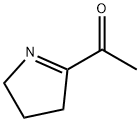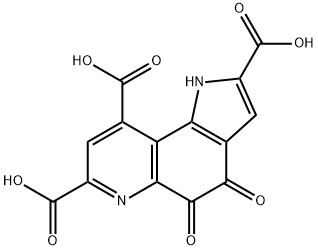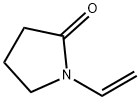Ethanone, 1-(3,4-dihydro-2H-pyrrol-5-yl)- (9CI)
- CAS NO.:85213-22-5
- Empirical Formula: C6H9NO
- Molecular Weight: 111.14
- MDL number: MFCD09864890
- SAFETY DATA SHEET (SDS)
- Update Date: 2024-11-19 20:33:22

What is Ethanone, 1-(3,4-dihydro-2H-pyrrol-5-yl)- (9CI)?
Description
November is flavor and aroma month at MOTW!
2-Acetyl-1-pyrroline (2AP) is a ketone derivative of the heterocyclic compound 1-pyrroline. The hazard information table shows that the pure compound has some dangerous properties, but you probably know it from its pleasing aroma.
In 1982, Ron G. Buttery and Louisa C. Ling at the US Department of Agriculture (Albany, CA) and Bienvenido Juliano at the International Rice Research Institute (Los Ba?os, Philippines) identified 2AP as an important aroma component of cooked rice. It is present in the volatile oils of basmati and Calrose rice. The researchers also synthesized 2AP via the catalytic reduction of 2-acetylpyrrole, followed by oxidation with silver carbonate.
The following year, the same authors identified 2AP in the leaves of the tropical plant pandan (Pandanus amaryllifolius). The leaves are used as a flavoring agent in south and southeast Asia.
Later in the 1980s, chemists began to identify 2AP in the aroma of baking bread. In 1985, Peter Schieberle and Werner Grosch at what is now the Technical University of Munich (Garching, West Germany) reported that the compound, in addition to other flavor and aroma ingredients, is present in the crusts of wheat and rye breads. 2AP is formed by the Maillard reaction that is characteristic of baking bread, in which amino acids and reducing sugars react to form the components of the crust’s brown color.
Curiously, on a less appealing note, 2AP also contributes to the urine odor of several Asian mammals, including the bintarong (Arctictis binturong; aka the bearcat) and three subspecies of tiger (Panthera tigris).
Chemical properties
Yellow to Orange Liquid
The Uses of Ethanone, 1-(3,4-dihydro-2H-pyrrol-5-yl)- (9CI)
It is isolated from rice and identified as the compound responsible for the flavor and aroma of scented rice after cooking.
Definition
ChEBI: 2-acetyl-1-pyrroline is a pyrroline that is 1-pyrroline in which the hydrogen at position 2 is replaced by an acetyl group. It is an aroma and flavour compound present in jasmine rice and basmati rice. It is responsible for the 'popcorn' aroma in a large variety of cereal and food products. It is one of the key odourants of the crust of bread and considered to be responsible for the cracker-like odour properties. In bread, it is primarily generated during baking but amounts are influenced by ingredient composition and fermentation conditions. It has a role as a metabolite, a flavouring agent and a Maillard reaction product. It is a methyl ketone, a pyrroline and an acylimine.
Properties of Ethanone, 1-(3,4-dihydro-2H-pyrrol-5-yl)- (9CI)
| Melting point: | 19° c |
| Boiling point: | 182.9±23.0 °C(Predicted) |
| Density | 1.09±0.1 g/cm3(Predicted) |
| storage temp. | Inert atmosphere,2-8°C |
| solubility | soluble |
| appearance | colorless to yellow solid or liquid |
| pka | 5.69±0.20(Predicted) |
| Odor | characteristic odor of white bread crust |
Safety information for Ethanone, 1-(3,4-dihydro-2H-pyrrol-5-yl)- (9CI)
| Signal word | Warning |
| Pictogram(s) |
 Exclamation Mark Irritant GHS07 |
| GHS Hazard Statements |
H315:Skin corrosion/irritation H319:Serious eye damage/eye irritation H335:Specific target organ toxicity, single exposure;Respiratory tract irritation |
| Precautionary Statement Codes |
P261:Avoid breathing dust/fume/gas/mist/vapours/spray. P305+P351+P338:IF IN EYES: Rinse cautiously with water for several minutes. Remove contact lenses, if present and easy to do. Continuerinsing. |
Computed Descriptors for Ethanone, 1-(3,4-dihydro-2H-pyrrol-5-yl)- (9CI)
Ethanone, 1-(3,4-dihydro-2H-pyrrol-5-yl)- (9CI) manufacturer
Varanous Labs Pvt Ltd
New Products
4-Fluorophenylacetic acid 4-Methylphenylacetic acid N-Boc-D-alaninol N-BOC-D/L-ALANINOL Tert-butyl bis(2-chloroethyl)carbamate 3-Morpholino-1-(4-nitrophenyl)-5,6-dihydropyridin- 2(1H)-one Furan-2,5-Dicarboxylic Acid Tropic acid S-2-CHLORO PROPIONIC ACID ETHYL ISOCYANOACETATE 2-Bromo-1,3-Bis(Dimethylamino)Trimethinium Hexafluorophosphate (6-METHYL-[1,3]DITHIOLO[4,5-b]QUINOXALIN-2-ONE INDAZOLE-3-CARBOXYLIC ACID 4-IODO BENZOIC ACID (2-Hydroxyphenyl)acetonitrile 4-Bromopyrazole 5,6-Dimethoxyindanone 2-(Cyanocyclohexyl)acetic acid 4-methoxy-3,5-dinitropyridine 2-aminopropyl benzoate hydrochloride 1-(4-(aminomethyl)benzyl)urea hydrochloride diethyl 2-(2-((tertbutoxycarbonyl)amino) ethyl)malonate tert-butyl 4- (ureidomethyl)benzylcarbamate Ethyl-2-chloro((4-methoxyphenyl)hydrazono)acetateRelated products of tetrahydrofuran
You may like
-
 85213-22-5 2-Acetyl pyrroline 98%View Details
85213-22-5 2-Acetyl pyrroline 98%View Details
85213-22-5 -
 2033-24-1 98%View Details
2033-24-1 98%View Details
2033-24-1 -
 1975-50-4 98%View Details
1975-50-4 98%View Details
1975-50-4 -
 2-HYDROXY BENZYL ALCOHOL 98%View Details
2-HYDROXY BENZYL ALCOHOL 98%View Details
90-01-7 -
 2-Chloro-1,3-Bis(Dimethylamino)Trimethinium Hexafluorophosphate 221615-75-4 98%View Details
2-Chloro-1,3-Bis(Dimethylamino)Trimethinium Hexafluorophosphate 221615-75-4 98%View Details
221615-75-4 -
 61397-56-6 CIS BROMO BENZOATE 98%View Details
61397-56-6 CIS BROMO BENZOATE 98%View Details
61397-56-6 -
 14714-50-2 (2-Hydroxyphenyl)acetonitrile 98+View Details
14714-50-2 (2-Hydroxyphenyl)acetonitrile 98+View Details
14714-50-2 -
 118753-70-1 98+View Details
118753-70-1 98+View Details
118753-70-1

